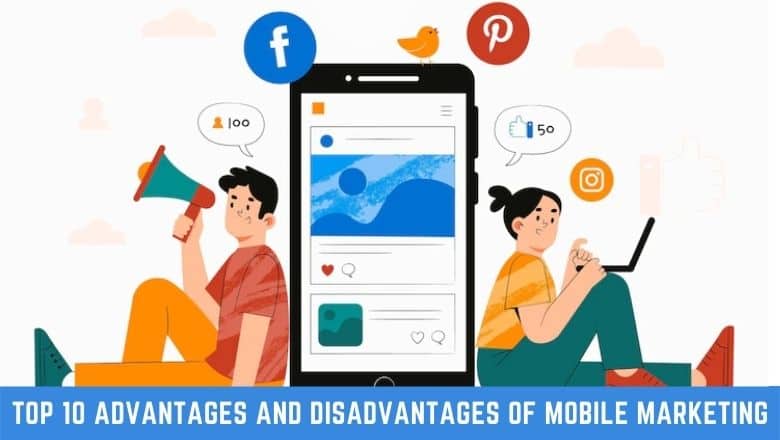In this article, I will explain all about “What are the Advantages and Disadvantages of Mobile Marketing“. After reading this article you will know all the pros and cons of mobile advertising.
Table of Contents
What is Mobile Marketing?
Marketing via mobile devices, such as smartphones and tablets, refers to advertising activities that promote products and services. It employs the features of modern mobile technology, such as location services, to customize marketing campaigns based on an individual’s location.
A mobile market is a way of promoting goods or services to a user who is constantly connected to a network through the use of technology.
Ninety-six percent of Americans have a cellphone of some kind, according to the Pew Research Center. Between 2011 and 2019, the number of Americans who own a smartphone increased by 46%.
I think we can all agree that smartphones have become an integral part of our daily lives, our work lives, and our everyday routines. Just how huge is this phenomenon? Bankmycell.com reports the following staggering statistics about smartphones:
- There are over 17,000 times a year that the average smartphone user checks their device – that’s 47 times per day!
- The average person spends almost 3 hours per day on their phone, and if you count tablets, it’s over 4 hours each day.
- In addition, CNBC reported in early 2019 that 73% of people will access the internet exclusively via their smartphones by 2025.
These statistics demonstrate that mobile isn’t going anywhere. For brands to remain competitive, they need to continue optimizing their mobile marketing strategies, connecting with their audiences, and staying in touch with them.
Here are some insights on the advantages and disadvantages of mobile marketing and advertising. It is our hope that these will allow you to keep up-to-date on the latest developments in marketing and mobile technology.
Let’s explain all the advantages and disadvantages of mobile advertising one by one.
Advantages of Mobile Marketing
I am gonna explain advantages of mobile advertising first and then we will go for disadvantages.
Easy access
Most of the time, our phones are by our sides. In addition, the average user spends over an hour per day on the top five social media apps and taps, swipes and clicks their phone over 2,600 times per day.
Pew Research Center reported that 37% of U.S. adults use their smartphones more than anything else when accessing the internet in 2019.
There are many reasons why mobile marketing should be a priority for your company. Your ads/campaigns will be more easily seen by us, the users, because of the accessibility of phones.
Location and personalization
By using mobile marketing, you can reach people at any place, at any time – at work, at home or even on vacation (we don’t usually encourage this last one).
Using location-based marketing, a lot of information can be gathered about user preferences just by using their phones.
This can help with ad personalization – targeting advertisements that can be tailored to speak directly to a single person, based on things like purchase history and location.
Viral potential
There’s no denying it – we like to share things with our families and friends, especially if they are good, interesting, or have other value.
There is more potential for something to go viral with mobile marketing. You will get much more exposure without spending any extra money.
Instant transactions
The mobile phone is your best friend when it comes to impulse purchases – and consequently if you’re a seller as well. waiting in line at your local favorite retail store: Items will catch your attention as you wait, and hopefully lead to a purchase.
A mobile advertisement accomplishes the same thing.
Our smartphones serve as a form of entertainment, and boredom can lead us to try out new things. You can fulfill a consumer need as a seller who offers online offerings.
Cost effectiveness
It is probably one of the most important advantages of mobile marketing, and there are a few different ways to look at it. Because mobile devices have smaller screens than desktops or laptops, there is less space for advertising, and the content that must be used is also much smaller and less expensive.
Due to this, mobile advertising has a much lower cost than radio or television advertising. Moreover, targeting plays an important role in this. Targeted advertising can help you reach customers who want and need to see your ads. In case your campaign doesn’t work, you can save money by stopping it.
Instant Result
People always carry their mobile phones with them. In most cases, the user also has his or her mobile phone on, so they receive the message at the exact moment it is sent.
When the user turns on his mobile device, the message appears as soon as the device is in standby mode. As a result, mobile marketing techniques are usually instantaneous.
Direct marketing
From their mobile devices, users interact with the mobile platform. Direct interaction allows for a more personalized experience. By utilizing this benefit, marketers can even engage in direct dialogue with users, receiving immediate feedback via SMS.
Tracking user response
Nearly instantaneous tracking of user response is possible. The mobile marketer can therefore better understand and analyze user behavior, improving their own standards of service.
Microblogging benefits
More and more mobile users are using microblogging platforms like Twitter. A marketer can greatly benefit from microblogging. Your advertisement is seen by hundreds of people, even if one person just retweets it.
Puts you ahead of your competitors
Many companies still haven’t adapted to mobile marketing despite the fact that you may think they are online. You will have an advantage if your business reaches out with all these benefits of mobile marketing first.
Disadvantages of Mobile Marketing
Now, let’s go ahead and explain the disadvantages of mobile advertising now.
Little room for errors up front
The first impression counts for a lot. Ads that give viewers a negative first impression will unfortunately be the ones that matter most.
Make sure your content and ads are error-free. The nature of mobile advertising makes it extremely difficult to fix a mistake before it is seen.
Potential for bad user experiences
The first disadvantage is compounded by this. Remember when I told you to “let it go viral”. A poorly done ad or content can go viral just as easily as a good one.
Make sure to review your ad carefully, perhaps even have more than one person review it and make sure that your ad will not be misconstrued.
Possible navigation issues
Mobile advertising should take into account the fact that 80% of U.S. phones are smartphones, which means that around 20% of consumers are using standard cell phones.
While some users might be interested in your advertisement, others may not be able to view.
User costs
There is one disadvantage that shouldn’t be overlooked. It’s true that we see advertisements about unlimited data, but it doesn’t mean everyone has an unlimited plan.
Please be aware that some people viewing your ads may be subject to standard data and texting charges.
It’s hard to ignore the rise of mobile marketing, as the benefits mentioned above indicate. Mobile marketing has become essential for growing brands, especially since people are spending more and more time on their mobile devices.
For more information about how your online marketing strategy should account for people using smartphones, or if you haven’t already optimized your website for mobile, contact us now.
Platforms too diverse
Unlike computers and laptops, mobile devices do not have any particular standard. Screen sizes on mobile phones vary widely, as they come in all shapes and sizes.
In addition, mobile platforms are vastly different, using different operating systems and web browsers. This makes it difficult to create a single campaign for all of them.
Privacy issues
Mobile marketers need to respect and understand that users wish to have their privacy respected online. It is therefore important that they only engage in promotional activities if they have the consent of the user.
Mobile landing page optimization
In mobile marketing campaigns, mobile marketers want to direct their customers to a specific landing page. To ensure a seamless user experience, landing pages must be optimized for mobile screens.
Coding makes it difficult to optimize for mobile screens. In some cases, the code develops bugs, while in others, the design doesn’t function as well on the mobile screen as it does on a desktop computer.
As more and more people access the internet via their mobile devices, mobile marketing is imperative today. Mobile marketing has more advantages than disadvantages, according to our assessment. It creates ads that people dislike.
Advertisements on mobile phones are interruptive in nature. With it, you can create a message that will be remembered, which can be a plus. It becomes a disadvantage when you create frustration for the user by interrupting their mobile experience in some way.
The HubSpot report states that 70% of people who regularly use a mobile device dislike seeing mobile ads.
Over 90% more people are using mobile ad-blocking apps than they were a year ago. In order to avoid wasting your money, you must be specific with your advertising targets.
It feels like telemarketing.
How many times have you received phone calls trying to sell you something at dinner time? Mobile ads do the same thing throughout the day for users.
Despite the fact that consumers have opted-in to receive marketing messages from you, there is no guarantee that they will want to continue receiving them. With this advertising option there is no guarantee of success even if you automate your entire process and allow your ads to generate results on their own.
Ignored by Viewers
Goo Technologies’ first annual Goo Online Advertising Survey revealed that 82% of Americans ignore online ads, compared with 37% who ignore TV ads. Across six different types of media, 92% of Americans ignore at least one type of advertisement each day.
Conclusion on Advantages and Disadvantages of Mobile Marketing
In light of these advantages and disadvantages, businesses cannot ignore mobile advertising. Over half of all internet traffic is derived from mobile devices. Each year, mobile devices account for more and more of e-commerce traffic.
Mobile devices are being used more often than ever before. The campaign, which was targeted to a well-researched demographic, makes sense as an investment.





